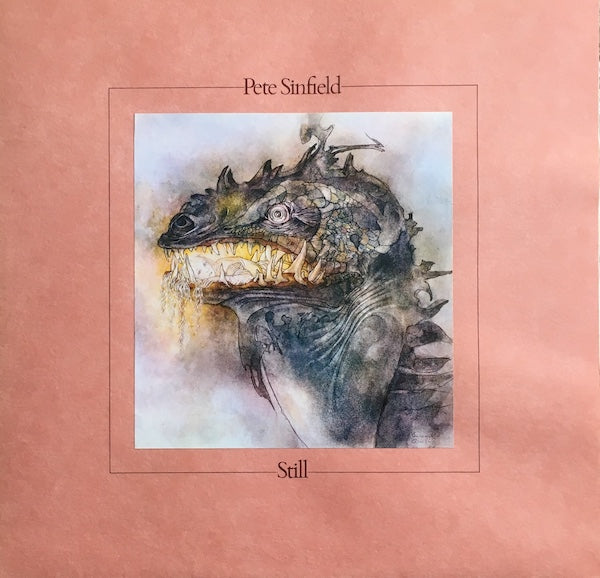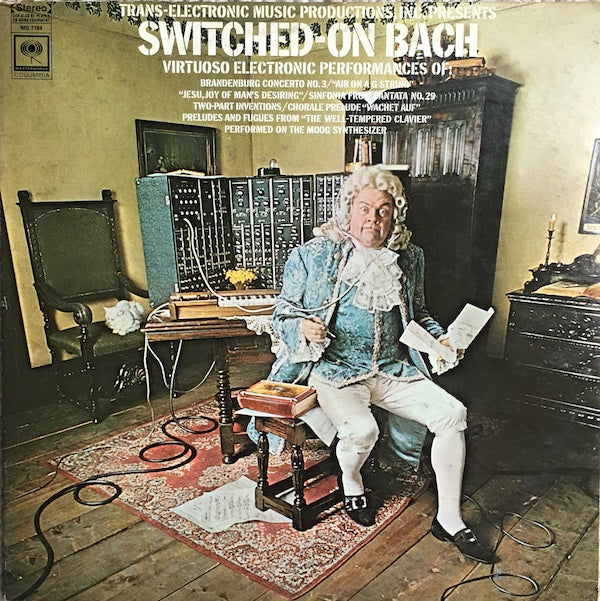Cov•er•ing: in music, performing a song that has been written or recorded by the original artist
Bor•row•ing: obtaining or receiving something with the understanding that it will be returned (or, in this case, at least acknowledged or credited)
Steal•ing: taking without right or permission
When the groundbreaking album Switched-On Bach by Wendy Carlos was released in 1968, it was received with both acclaim and derision, but at least no one could claim the music was uncredited. Many classical purists found it sacrilegious, yet famed pianist Glenn Gould, one of the most highly regarded performers of Bach’s music, praised it highly. The album would go on to win Grammy awards and ultimately receive Platinum certification, a rarity for classical recordings.
The original album cover shown above was quickly replaced with another image from the same photo shoot showing “Bach” standing by the synthesizer with a more bemused expression on his face. Carlos and producer Rachel Elkind had objected to the first cover for two reasons: 1) they felt the facial expression was undignified, and 2) the headphones were erroneously plugged into an input, rather than the proper output of the Moog synthesizer. The replacement image was also reproduced more clearly.
Progressive rock is often characterized by the use of elements of classical composition such as repeating themes, shifts in dynamics, rhythmic changes, unusual time signatures, and distinct sections within a song. It’s only reasonable to assume that snippets (or sometimes whole pieces) occasionally find their way onto a rock album.
The sticking point for me is when a classical theme or melody is incorporated into a rock song without crediting the composer. My sense of fairness and justice does not allow for that sort of thing. Here are some examples of rock artists covering, borrowing or outright stealing from classical composers. (The rock YouTube entry comes first, followed by the classical performance.)
Gustav Holst’s The Planets is one of those compositions that make a good introduction to classical music for non-classical fans, and, as such, certain parts like “Mars, the Bringer of War” have been incorporated into a number of rock performances.

King Crimson – “The Devil’s Triangle” – (Holst)
I am a big fan of the early King Crimson albums, and have a great deal of respect for guitarist Robert Fripp, but that is tempered by the fact that on In the Wake of Poseidon he took “Mars, the Bringer of War” without crediting Holst. No excuse.

The Mothers of Invention – “Invocation and Ritual Dance of the Young Pumpkin” – (Holst)
Frank Zappa was no stranger to classical music and composers. On this track from the album Absolutely Free, he uses an uncredited snippet from Holst (“Jupiter”).
Ravel’s “Bolero” is another classical piece that has found great favor with a number of rock outfits. Well before the movie 10 brought Bo Derek and “Bolero” into our consciousness, Jeff Beck and others had adapted it.

James Gang – “The Bomber” – (Ravel)
On The James Gang Rides Again, Joe Walsh and company inserted “Bolero” into a long track that also incorporated a cover of Vince Guaraldi’s “Cast Your Fate to the Wind.” After the release of the album, objections from the estate of Maurice Ravel resulted in the “Bolero” section being removed from the piece with a rather clumsy edit, and the album cover was reprinted to reflect that omission. My copy of the album doesn’t mention the Ravel piece on the cover, but the label on the record and the recording itself include it.

Colosseum – “Bolero” – (Ravel)
British drummer Jon Hiseman’s band was a jazz/blues/rock outfit in the early 1970s. In the liner notes for their album The Grass is Greener, the group’s guitarist Dave Clemson had this to say about the inclusion of “Bolero”: “A diabolical liberty really. It’s got a horrible guitar solo which I was told to play. I hate it. P.S This was written for me. I hate it. P.P.S. So was that.” (I’ve got to admit, it’s not the best version of the piece.)

Pete Sinfield – “Song of the Sea Goat” – (Vivaldi)
Peter Sinfield was the lyricist for the first four King Crimson Albums. He also worked with Emerson, Lake & Palmer. This track is from his only solo album, which was released on ELP’s Manticore label. Here Sinfield has adapted an instrumental work, Vivaldi’s Guitar Concerto in D, (fully credited) into a vocal piece. Although his voice is a bit weak, I actually think the melody works better sung, as the guitar notes seem too staccato to my ears.

Love Sculpture – “Farandole” – (Bizet)
Love Sculpture was one of the earliest bands for Welsh rocker Dave Edmunds. Their first album was Blues Helping, and you can guess the genre. The trio morphed into a more progressive outfit, and performed a number of fully credited classical pieces on their second album Forms and Feelings. Here, Bizet’s “Farandole” is given the full rock treatment.

Gabor Szabo – “Fire Dance” – (de Falla)
A number of Hungarian-American guitarist Gabor Szabo’s albums consisted of jazz versions of pop songs. For his beautifully produced album Dreams, on Gary McFarland’s short-lived Skye label, he branched out to record original material and several credited classical adaptations.

Emerson, Lake & Palmer – “Knife Edge” – (Janacek/Bach)
Keith Emerson arranged a number of classical pieces from composers such as Tchaikovsky, Sibelius, and Bach for his pre-ELP group, The Nice. This track from ELP’s first album is listed as an adaptation of Leon Janacek’s “Sinfonietta,” but it also includes an uncredited bit from Bach’s “French Suite No. 1” in the middle of the piece.

The Load – “Brandenburg Concerto #3 (third movement)” – (Bach)
The Load was a 1970s Midwestern emulation of Emerson, Lake & Palmer. They, too, did a number of classical adaptations on their cheekily titled album Praise the Load.

Manfred Mann’s Earth Band – “Starbird” – (Stravinsky)
Manfred Mann’s eponymous 1960s pop group had hits with “Do Wah Diddy Diddy” and a cover of Bob Dylan’s “The Mighty Quinn.” The 1970s saw a new lineup, new name (Manfred Mann’s Earth Band), and a new direction toward progressive rock. On their seventh album, The Roaring Silence, they scored another hit with a cover of Bruce Springsteen’s “Blinded by the Light.” Also on that album was “Starbird,” the intro to which is clearly taken from Igor Stravinsky’s “Firebird Suite.” Guess who isn’t credited?
These are just a few examples of rock artists plundering the classical oeuvre. There will be another installment in the future.


